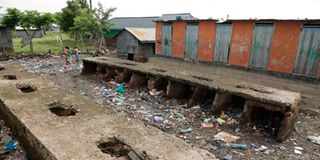Open defecation still a major issue in Homa Bay county

The sorry state of abandoned toilets in Remba Island, Homa Bay County on February 9.
Poor sanitation remains a major concern for health officers in Homa Bay County as it leads to transmission of diarrheal diseases such as cholera and dysentery.
The county is still struggling with open defecation and other hygiene changes as families, especially in rural areas, use the bush to relieve themselves, eventually leading to contamination of water sources.
To mitigate the challenge, the United States government is funding a campaign that will see families own toilets and use them.
The US government will fund sanitation projects with a grant of $24 million under a programme called the Western Kenya Sanitation Project (WKSP), which will be implemented in eight counties.
Among the initiatives meant to improve sanitation is the construction of pit latrines.
Focus has been put on Homa Bay, where more than 12,500 households will have latrines built for them.
Statistics from the county’s public health department show that Homa Bay has 89 per cent latrine coverage, with Ndhiwa sub-county cited as an area where latrines are not used and where open defecation is rampant.
WKSP Deputy Chief of Party Roselyn Okwiri said they are partnering with the Homa Bay government to implement the programme within five years.
Ms Okwiri said they will identify and train at least 30 artisans in each of the eight sub-counties in Homa Bay to help them build modern latrines.
“Youths have been given opportunities to provide innovative solutions and improve sanitation in the community. Training will help in capacity building,” she said.
She told journalists that they will build latrines that can be easily drained.
The latrines will have concrete bases.
Black cotton
This helps improve the structural integrity of the faculties especially in Ndhiwa, where black cotton soil makes construction difficult.
Ms Okwiri added that the latrines will be connected to sewer systems run by the county government for easy management.
Besides building latrines, the organisation will also provide menstrual hygiene management interventions to adolescent girls.
Ms Okwiri said they will work closely with companies that make sanitary pads to supply the items to their identified enterprises so that they can be easily accessed by the targeted group.
"We are encouraging the use of reusable towels for economic purposes and environmental conservation," she said.
Homa Bay is considered a remote county where many girls cannot afford to buy sanitary towels.
This interferes with their academic programmes and menstrual hygiene.
Making sanitary towels available will allow teenage girls to better manage their menstrual hygiene.
"We want to reduce the stigma that is associated with difficulties in accessing sanitary towels," Ms Okwiri said.
Homa Bay County Water and Environment Executive Dickson Myawinda said they are working on a master plan that will ensure continuous water supply to Homa Bay residents for improved sanitation.
The county government recently signed a deal with the Belgian government to help them increase water supply.
“We are currently working on increasing water supply to residents.
We are also putting modalities in place to ensure our sewer systems operate without failure," he said.





